
So, to continue a response to Malick’s “The Tree Of Life,” posted earlier. There is a scene of a dinosaur lying on it’s side in a stream bed (I don’t know why but I felt that it was a girl dinosaur, maybe even in labor, it’s hard to decide). The Mesozoic world is strange and largely unknown to us, but we know enough of how things work here, in what we have named the “natural world,” that any animal that appears defenseless, weak, wounded, is in great risk. I am afraid for her. Then, my fear proves prescient and another dinosaur appears out of the foliage and spots the vulnerable one. I don’t really know much about dinosaurs but this other dinosaur is clearly some kind of larger predator/raptor. It charges toward the vulnerable one just laying there like a waiting sacrifice. Then, in a seemingly cruel act, it takes it’s clawed foot and forcefully pushes the face of the weak and dying one into the ground. I cringe and wait for the predator to start tearing into the flesh of the helpless one, to consume it’s life-blood; but then the predator does a peculiar thing, it lifts it paw for a moment, letting the wounded one raise it’s head just for an instant. Then, almost gently, it pats the dying one on it’s head once more and then scurries away, stops, looks up towards the the heavens...and end of scene.
All the actions of these creatures (within this structure of representation, that is, attending to Guy Debord’s insight that ‘spectacle is capital accumulating until it forms an image’) are *made* intelligible to us through preexisting systems of symbol and meaning that we do not create or control; convenient fictions, in a web of significations as complex as Malick’s gestating universe. Merleau-Ponty in “The Primacy of Perception” argued: “The world is already constituted, but also never completely constituted; in the first case we are acted upon, in the second we are open to an infinite number of possibilities.... There is, therefore, never determinism and never absolute choice, I am never a thing and never bare consciousness” (PofP, p. 453). Merleau-Ponty I think agreed with Heidegger that ‘being-in-the-world,’ is too complex, too mysterious (even too glorious?) to ever be understood simply through materialist teleology, empiricist notions of cause and effect, clever logical-positivist syllogisms, or patterns of technologically mediated consumption engraved as absolutes As M-P says “...In a world which really is topsy-turvy, the true is a moment of the false.”
This I think is why the actions of the predator are so disjunctive. Malick (a Heidegger scholar and translator (and Chaldean Christian?) who taught his students Merleau-Ponty, DeBord and Husserl) disrupts the established narrative structures by which we understand the world of dinosaurs, the world of power and weakness, the world of master and slave, of kill or be killed--as well as the world of sacrifice and mercy. But could a dinosaur be merciful? How do we interpret the predator’s action with any certainty? What meaning do I impose on it and how do I interpret my own experience of this action and then choose myself to act in a meaningful way? All the while maintaining the awareness that it is all a spectacle orchestrated by another being mired in another equally inter-referential matrix of significations as I am? “The world is... the natural setting of, and field for, all my thoughts and all my explicit perceptions. Truth does not ‘inhabit’ only ‘the inner man,’ or more accurately, there is no inner man, man is in the world, and only in the world does he know himself.” (PofP preface) MP is arguing that whatever I know of the multiplicities of my self is always and only in relation to others (and I would add to the ‘Other’). Sarte’ some time ago wrote something like, ‘we are all thrown into this world not of our making and not of our choosing....’ Even so, we seem to be, pacing Sarte, Heidegger, Levinas and Jesus, ‘condemned to freedom,’ which includes the freedom to wound, exploit, consume, and kill others, even the Other!
The narrator has asked into the void, into the consuming chaos of the Eye of God: “Who are we to you,” then we witness this predator that has been given the power of life and death over others look to the heavens for a fraction of an instant, and in the next scene we see this giant asteroid hurtling toward earth that will destroy all the dinosaurs, the strong and weak alike, and most all forms of life on the planet. Is this what the predator was looking up at? After one act of mercy the world is changed forever? One instant I was watching and pondering the possibility of compassion in the heart of a predator and in the fabric of creation (and it’s Creator?) when ZOOM-CRACK, both predator and victim are wiped out by the same act of chance/choice...and then life begins again, is worlded into existence. Will the new world be better than the old? By what measure will we decide? What choices will we make? What will we do?...Is this what you are asking us?
Obliged.




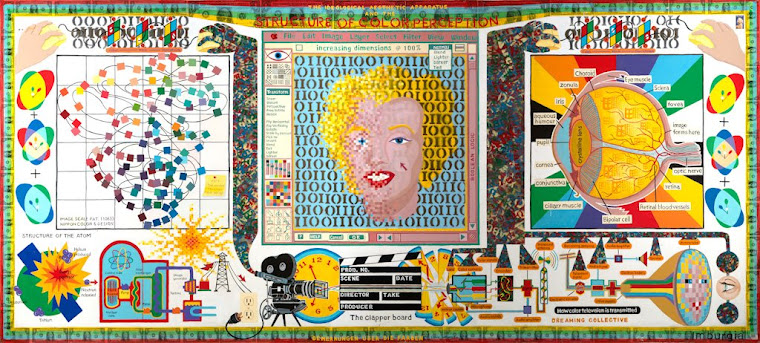
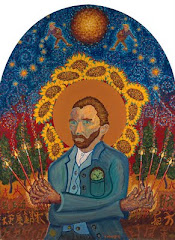


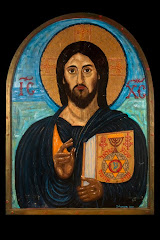
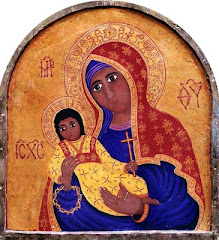

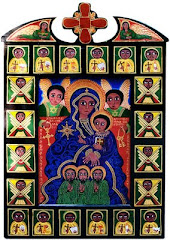

No comments:
Post a Comment